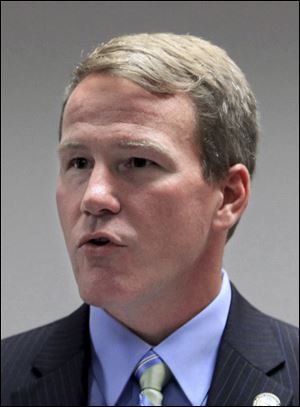
Uniform voting
8/17/2012
Ohio Secretary of State Jon Husted declared this week that all 88 of the state's counties will have the same hours for early voting this fall. He called his directive fair and uniform, but these are not necessarily the same thing.
Mr. Husted had used his power to break tie votes by several county boards of election in favor of more-restrictive hours for early voting. The partisan deadlocks were in Democratic-leaning urban counties -- including Lucas County -- while Republican elections board members in GOP-leaning counties did not object to extended hours there.
That led national media and Democrats to accuse Ohio Republicans -- including Mr. Husted, the state's chief elections official -- of trying to suppress the Democratic vote in order to tilt the Nov. 6 presidential election here toward Republican nominee Mitt Romney.
Mr. Husted addressed these complaints by announcing that early-voting hours in every county will be 8 a.m. to 5 p.m. weekdays during the first three weeks of early voting, and 8 a.m. to 7 p.m. until the Friday before Election Day, with a few exceptions for holidays and already mandated hours. Only members of the Armed Forces and their families can vote on the Saturday, Sunday, and Monday before Election Day -- a policy the Obama campaign is challenging in court.
Click here to read more Blade editorials.
Mr. Husted says 230 hours of early voting are plenty, especially because Ohioans also can vote early by absentee ballot. But the early-voting schedule will affect voters differently. Getting time off from work to vote during the day can be hard, especially for people with low-wage jobs.
Who else might have trouble getting to early-voting locations during restricted hours? Elderly people who often depend on others to get around, single parents with young children in school or child care, people who don't have cars, and people who hold multiple jobs.
So uniformity alone is not necessarily fair to voters who are poor, elderly, minorities, or single (generally female) parents. That is: people who might be more likely to vote Democratic.
Until now, voting hours have been left up to Ohio counties to decide. Mr. Husted concedes Ohio law neither explicitly grants nor denies him the power to take the decision away from local elections officials. Some critics call his assumption of that authority an unwarranted assault on home rule.
If. Mr. Husted truly seeks, in his words, to "create fairness across the state for the first time," it would have been better to keep early-voting centers open uniformly at night and on weekends. The state has a substantial interest in encouraging more people to vote.
Mr. Husted's initial error was to side with Republican election-board members in urban counties who stonewalled expanded early voting. They deserved to be chided instead for seeking partisan advantage rather than protecting the votes of all Ohioans, and warned against such blatant voter-suppression efforts.
Meanwhile, there still is time for Ohio to get this right.